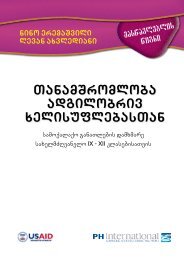The Geneva Protocol, by David Hunter Miller
The Geneva Protocol, by David Hunter Miller
The Geneva Protocol, by David Hunter Miller
You also want an ePaper? Increase the reach of your titles
YUMPU automatically turns print PDFs into web optimized ePapers that Google loves.
CHAPTER XX. 148<br />
80. Most of the speakers devoted some time to a statement of the views of their Governments on the Draft<br />
Treaty of Mutual Assistance, against which the main objections urged were the uncertainty in regard to the<br />
definition of aggression, the too wide discretion and powers conferred upon the Council and the evils<br />
attendant on the system of "complementary agreements" sanctioned <strong>by</strong> the Treaty. <strong>The</strong> first defect might now<br />
be remedied <strong>by</strong> the extension of the system of arbitration, which would simplify the definition of aggression.<br />
As regards the "complementary agreements," even those who recognized their harmful possibilities were<br />
compelled to admit that they could not be abolished or prevented, and that their power for evil might be<br />
lessened if they were controlled and brought within a general scheme of mutual assistance under the League.<br />
81. All the speakers were in substance agreed that the Covenant itself afforded the best basis for any scheme<br />
of mutual assistance; that it needed only to be developed and carried to its logical conclusion in order that it<br />
might provide an adequate basis of security.<br />
82. In summing up the debate the President observed that there appeared to be general agreement on the<br />
interdependence of the three problems of arbitration, security and disarmament, and on the point that a<br />
complete system could be evolved from the Covenant itself. Everyone was prepared to accept the principle of<br />
economic and financial sanctions, though some difference might exist on the subject of military sanctions.<br />
Little had been said about disarmament, which could only follow as a consequence of the solution of the twin<br />
problems of arbitration and security.<br />
{250}<br />
83. It was then agreed, on the morning of the 13th September, to appoint a sub-committee of representatives<br />
of twelve Delegations to formulate concrete proposals.<br />
84. <strong>The</strong> sub-committee, known as the Fourth Sub-Committee of the Third Committee, was composed as<br />
follows:--<br />
Lord Parmoor or Mr. Henderson (British Empire). M. Paul-Boncour (France). M. Schanzer (Italy). M.<br />
Branting (Sweden). M. Benes (Czechoslovakia). M. Villegas (Chile). M. Kalfov (Bulgaria). M. Poullet<br />
(Belgium). M. Titulesco (Roumania). Mr. Matsuda (Japan). M. Lange (Norway). M. Skrzynski (Poland).<br />
85. <strong>The</strong> sub-committee met for the first time on the afternoon of the 13th September, under the presidency of<br />
Dr. Benes. <strong>The</strong> first meeting was occupied <strong>by</strong> a discussion on procedure. In the first instance, it was proposed<br />
to appoint a drafting committee of three members to draw up proposals, keeping in close touch with a similar<br />
committee to be appointed <strong>by</strong> the First Committee, but this idea was subsequently abandoned, and the<br />
President was requested to draw up the outline of a scheme, to be submitted to the sub-committee, if possible,<br />
on the 15th September. This the President undertook to do, but he was only able to submit his proposals for<br />
the first time on the 16th September. <strong>The</strong> delay was due mainly to the necessity of consulting with<br />
representatives of the First Committee and with certain Delegations. In particular, meetings were held on the<br />
15th September between representatives of the French and British Delegations who went carefully through the<br />
scheme and reached a preliminary agreement on a number of points of principle. This agreement greatly<br />
facilitated the eventual completion of the work.<br />
{251}<br />
86. <strong>The</strong>se proposals were in the form of a draft <strong>Protocol</strong>, of which articles 1, 2, 3 and 5 concerned the First<br />
Committee, and have already been dealt with in the preceding section of this report. <strong>The</strong> remaining articles, as<br />
originally proposed, may be summarised as follows:--<br />
87. Article 4.--<strong>The</strong> Council or the Permanent Court may appoint International Control Commissions,<br />
composed of civilian and military experts, to ensure that during the course of the arbitral procedure none of
















